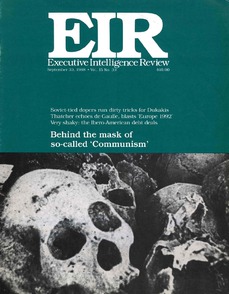From the Editor
by Nora Hamerman
Departments
Report from Rio
by Silvia Palacios
The cost of suspending the moratorium.
Report from Bangkok
by Sophie Tanapura
Burma coup no surprise in Thailand.
Andean Report
by Valerie Rush
Bankers’ revenge against Peru.
Dateline Mexico
by Hector Apolinar
The PRI and terrorism.
Vatican
by Maria Cristina Fiocchi
The Pope in southern Africa.
Editorial
Our future in space.
Science & Technology
U.S. water development: an aborted mission
by Ronald Kokinda
Ronald Kokinda looks at the recent history of sabotage of American water development projects, and with them, American economic and population growth.
AIDS Update
Dannemeyer fights for strong AIDS legislation
by William Jones
Economics
Defense production on the critical list
by Chris White
An Air Force Association report shows that without a sea-change in economic policy, the United States will not much longer be capable of defending itself.
Ibero-American debt deals shaky; elections loom for several nations
by Mark Sonnenblick
The time is running out for Egypt
by Thierry Lalevée
It’s the latest of the allies that Washington is sacrificing, as part of the new U.S.-Soviet global “understanding,” and in accord with IMF austerity demands.
Currency Rates
Panama battles for economic future
by Carlos Wesley
General Noriega has declared an end to more than a score of years of Panamanian economic dependency on drug-banking.
Colombia’s state oil company dismantled to pay foreign debt
by Javier Almario
Agriculture
by Robert Baker
The crop reports no one believes.
Banking
by Joyce Fredman
Worse than Hurricane Gilbert.
International Credit
by William Engdahl
Moscow smells a “golden” opportunity.
Business Briefs
Feature
Behind the mask of so-called ‘Communism’
by Lyndon H. LaRouche, Jr.
“This report on some crucial problems of irregular warfare is prompted by meetings ... with a man who is one of the world’s leading anti-communists, and also one of today’s leading strategic thinkers on the subject of those methods of ‘irregular warfare’ which have been adopted by the leaders of Moscow and Beijing,” writes Lyndon H. LaRouche, Jr. Nothing is truly understood about so-called Communism, or so-called fascism, unless they are understood as instruments of policy of powerful rentier-financier interests who have targeted Western culture for extinction.
International
Thatcher cites Christian values against ‘Europe 92’
by Mark Burdman
A political intervention into continental Europe by the British prime minister has created hysteria among the fascist one-worlders of Brussels, Bruges, and Luxembourg.
Food crisis and national explosions intensify Soviet succession fight
by Konstantin George
NATO trains defense against spetsnaz
by Rainer Apel and Michael Liebig
This year’s “LV’88” maneuvers finally acknowledged the existence of spetsnaz, if not in the framework of a realistic scenario.
Mexico’s Interpol chief dead in suspicious ‘suicide’
Indo-Sri Lankan agreement furthered ... but will it bring normalcy back?
by Ramtanu Maitra
Richard Murphy rigs Lebanon to explode
by Scott Thompson
Geneva accords spell genocide in Angola
by Jeffrey Steinberg
International Intelligence
National
LaRouche joins battle to shape next President’s policies
The independent presidential candidate, in an open letter released on Sept. 19, outlined his points of agreement, and of profound disagreement, with the policy orientation of Henry Kissinger and his “balance of power” co-thinkers.
Strauss reveals fascist agenda
by William Jones
The bi-partisan National Economic Commission set out to market a package of cuts in Social Security, Medicare, and defense, to the public and Congress-but did they overplay their hand?
Soviet-tied dopers run dirty tricks against Bush for Dukakis
by Joseph Brewda and Herbert Quinde
Now that the first phase of a Soviet intelligence operation smearing the Bush campaign as “Nazi-linked” has been completed, U.S. intelligence professionals would do well to draw the appropriate conclusions.
Eye on Washington
by Nicholas F. Benton
Will Canadians scuttle Free Trade Pact?
Congressional Closeup
by William Jones
National News



